‘Losing The Nobel Prize’ Makes A Good Point, But Misses A Great One

BICEP2 scientist Brian Keating’s new book is honest and insightful, but just as notable for what it fails to recognize.
Imagine what it’s like to be a scientist working on a problem at the very frontiers of your field. You’ve got a new experiment that’s capable of measuring some property of the Universe to a degree it’s never been measured before. Maybe it’s a colder temperature than you’ve ever achieved, a higher energy than humanity’s ever reached, a higher-resolution image of the Universe, or the ability to detect a predicted effect that’s never quite been measured before. Pushing the frontiers of fundamental science in a novel way is high-risk, high-reward stuff. You can spend your entire career on a single idea, and never find anything new. But if you make the key breakthrough and find what you’ve been seeking, you can win the ultimate prize in all of science: the Nobel Prize. In his new book, Losing the Nobel Prize, observational cosmologist Brian Keating takes us through his story of ambition, heartbreak, and the questionable lessons learned from the endeavor.
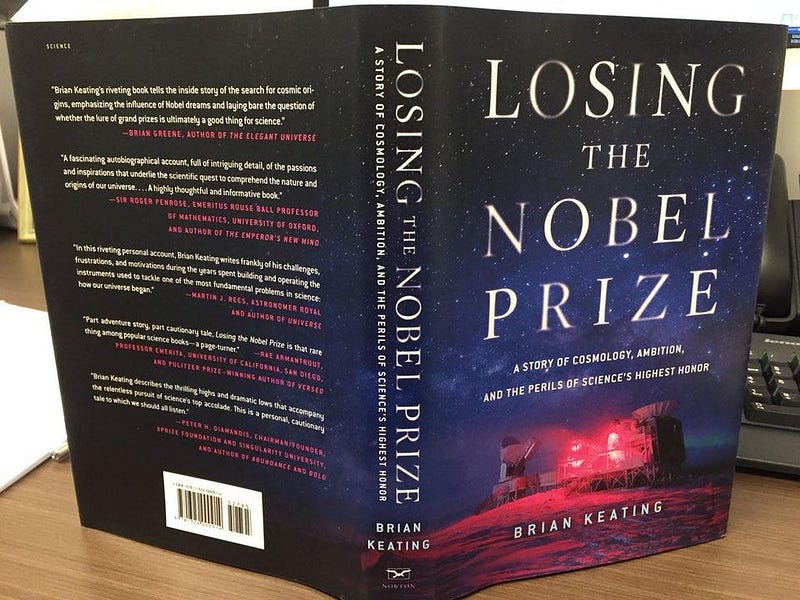
Right around 20 years ago, cosmologists were measuring the fluctuations in the Big Bang’s leftover glow to unprecedented precision. Balloon-borne experiements like BOOMERanG and MAXIMA, along with ground-based ones like CBI and DASI, were looking at smaller and smaller scales to very high precision, measuring sub-millikelvin fluctuations on small scales. These fluctuations could, for the first time, tell us the shape of the Universe, and would lead the way to more advanced, space-based observatories like WMAP and Planck, which could cover the whole sky and tell us what the Universe was made of.
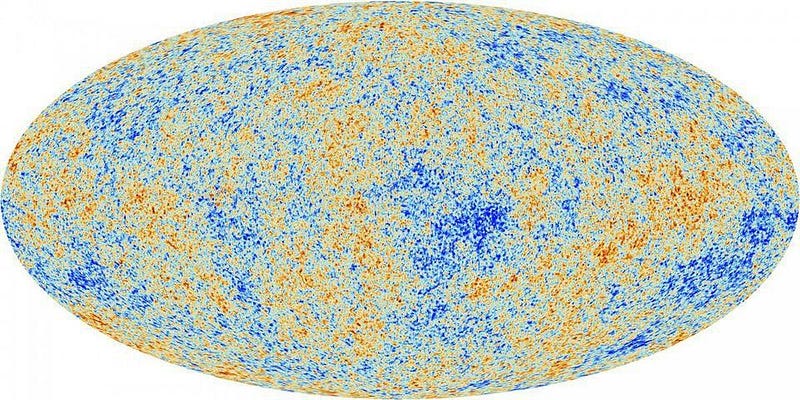
Along the way, however, a very clever, complementary technique was discovered that could do what none of these experiments could: look for evidence of not just density and temperature fluctuations, but of ripples in spacetime from the moment of the Big Bang itself. The theory of our Universe’s origin, cosmic inflation, predicts the creation of both scalar fluctuations, which create temperature/density imperfections, and tensor (gravitational wave) fluctuations, which should polarize the light left over from the Big Bang in a very specific way. Brian Keating, the author, came up with the first experimental design that could measure the “curling” of this light: Background Imaging of Cosmic Extragalactic Polarization (BICEP).
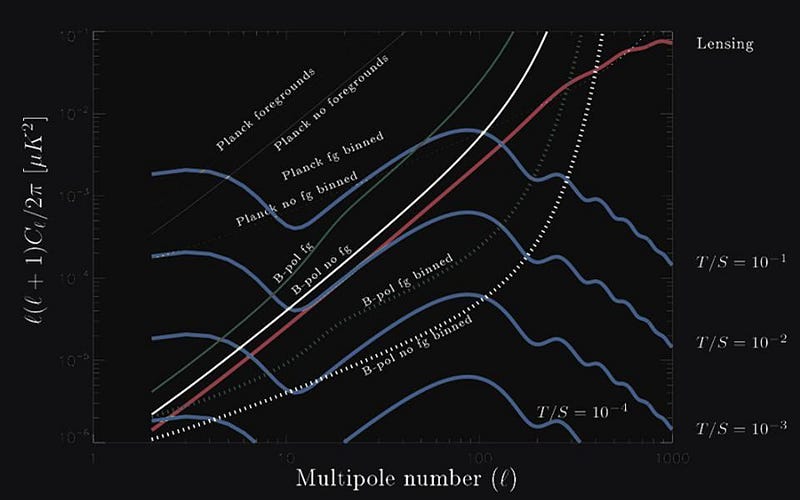
If you could measure this polarization and saw the evidence of these tensor fluctuations, you would have the first evidence for the gravitational waves left over from inflation: a smoking gun that not only would verify inflation, but would tightly constrain which model was correct. It would have been a huge deal. In a remarkable story, Brian lays out in painstaking detail — from a first-person perspective — what it was like to:
- design BICEP,
- work on multiple competing experiments designed to measure this effect,
- watch the power players come in and shut him and other researchers out of the inner-circle,
- be amazed at the positive-detection that BICEP2 made,
- and to watch in horror as his Nobel Prize dreams evaporated as the “signal” turned out to be nothing but dust.
He still, from what I read and like most scientists, doesn’t know how to cope with being wrong. At no point does he say, “I was wrong and should have done X instead of Y.” There is no responsibility taken on either his part or the part of BICEP2.
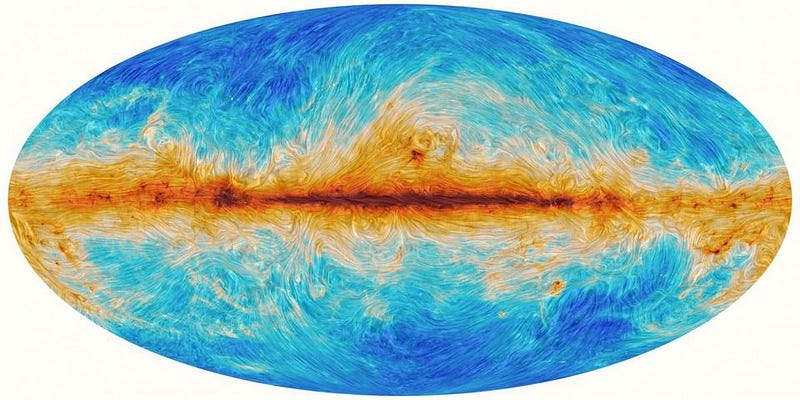
Brian’s major point in writing this book is to warn of the dangers of pursuing the Nobel Prize at all costs, and to point out the inherent ways the awarding of the prize is unfair. It’s certainly problematic that there are no posthumous awards; that awards are limited to being shared between 3 people; that collaborations cannot be awarded; and that the prize rewards luck/serendipity, which are factors no scientist, no matter how solid, can control. In this, he succeeds admirably. No rational, open-minded reader will come away from this book thinking that the great glory of winning the Nobel Prize is all it’s cracked up to be. Instead, as in many walks of life, who receives the award is determined not solely by merits, but by egos, PR, and a lot of biases. One doesn’t need to look far to find a slew of people who should have won, were the prizes awarded on merit alone.
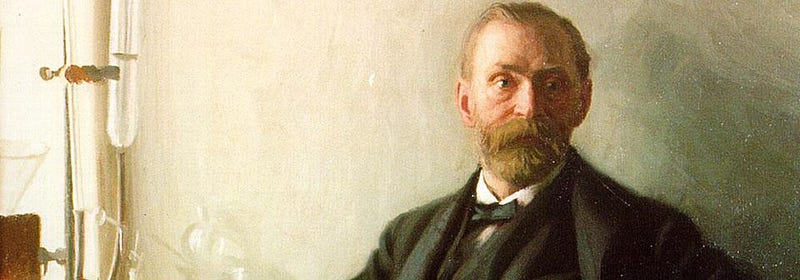
This book, however, isn’t merely about BICEP2 and the Nobel Prize; it tells a multitude of different stories. It’s part-autobiography, as Brian shares his stories of his upbringing, his religiosity, his estrangement from and reconciliation with his dad, and his perspective on it all. It’s part tell-all about what it’s like to work in science, from the pressure to have your career be all-consuming, to how you can get forced out of your own collaboration/experiment, to watching your close friends and colleagues die of suicide (an extremely common experience that I sadly share with Brian), to the insane competition and fear of being scooped, to the pursuit of prestige and glory, and how all of that leads to sloppy work. In all of this, it’s a well-told story that will either bore you where you can’t relate or make you nod along in agreement where you can.
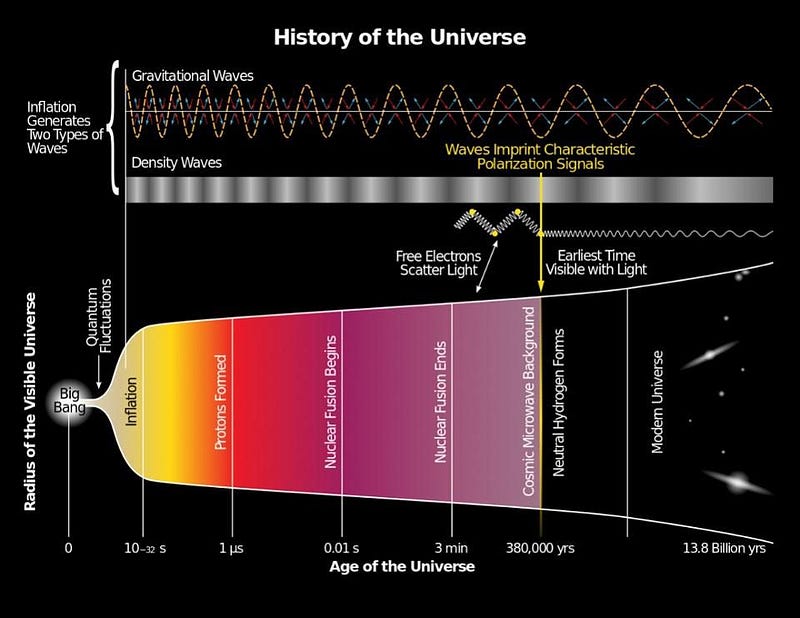
There are also some big misses in this book. Brian attempts to weave into the narrative both historical stories of the development of physics and astronomy and the scientific story of where we are today and how we got to be here. These portions of the book are, unfortunately, grossly oversimplified and outright wrong in detail in a great many aspects. As the tale is told, you would think that:
- there were no scientists or scientific developments before Galileo (in fact there were a great deal);
- that every controversy in astronomy, including the value of the Hubble constant, is due to dust (ignoring the actual evidence and the work of Walter Baade);
- that sunlight is made of different colors because of the elements present in the Sun (that is only true of the absorption lines; the Sun’s color comes from being a blackbody radiator);
- and that the Steady-State model was a viable alternative to the Big Bang as late as the late-1990s (it was ruled out far earlier, with the reflected starlight explanation demonstrably disproven previously).
He includes many graphics that demonstrate the super-outdated fallacy that the Big Bang means “extrapolating back to t=0” and takes place before inflation, despite knowing this cannot be so. Given the number of cosmologists who’ve read/reviewed this book, I expected these outright errors would have been caught, but weren’t. If you walk away from the book confused about whether the Big Bang takes place before or after inflation, or confused about when and where inflation occurs, it’s because the book itself is inconsistent on this account.
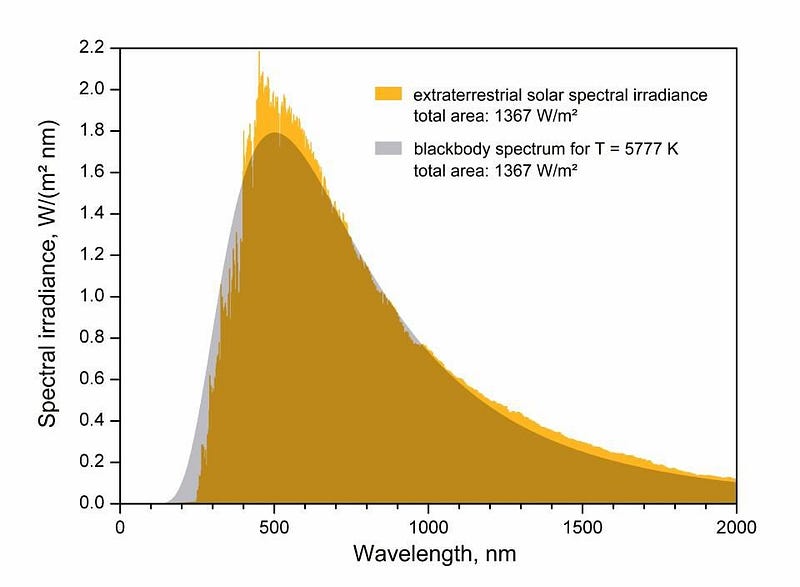
Those mistakes and oversights aside, there are two major missed opportunities I felt this book could have taken advantage of: one about the science and one about the societal aspect. Scientifically, Brian falls for perhaps the most common fallacy among scientists: the belief that sure, there was work done on this field/problem in the past, but it’s my contribution that will really, truly, definitively be the important one. Inflation isn’t waiting to be verified (it’s been verified by many different lines of evidence), as Brian contends, nor will the presence-or-absence of B-mode CMB polarization settle the issue.
You must not overstate the importance of your own work, and you must not diminish the importance of the results that others in your field have found. This kind of self-unaware navel-gazing is symptomatic of the culture of self-importance and the lack of recognition of others that’s so frustrating. Brian recognizes that these are problems and speaks out when others do it, but doesn’t look inward to see where he’s falling for the same trap.
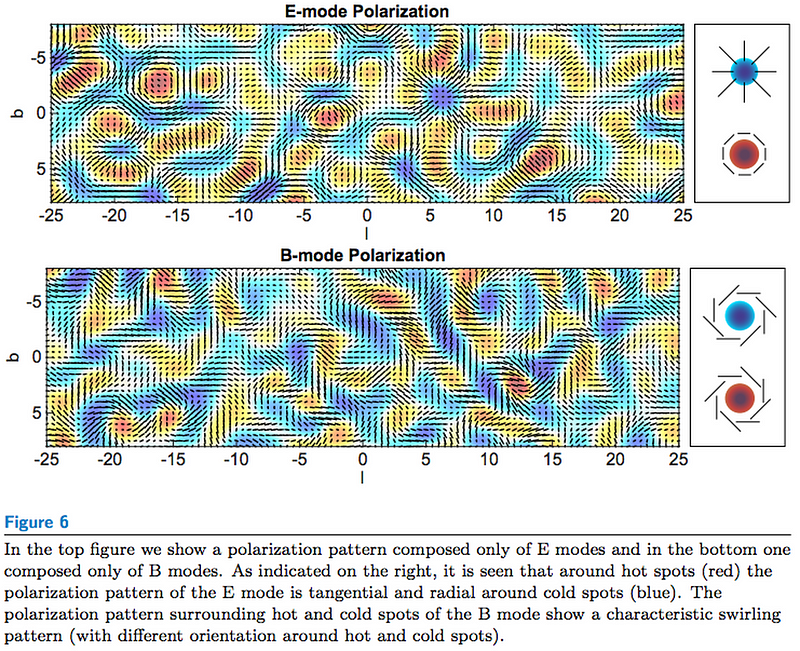
The societal problem is much bigger than merely how we glorify the Nobel Prize. It’s that we treat science like a competition, we reward, in general, being first, being right (even if it’s for the wrong reasons), while simultaneously devaluing the contributions of other fields to our own lines of inquiry. We attempt to glorify individuals, rather than scientific principles. We have a myth of a brilliant idea coming out of the blue to a single, unique mind, rather than rewarding hard work, care, collaboration, and taking the time to get things right. There’s a tacit pressure to join a big group, rise through the ranks to a position of leadership, and then direct these massive “big science” campaigns, rather than to focus on and explore whatever clever, niche ideas might be of interest. This lack of scientific playing-around means that most people in the field are doomed to mediocre careers working on mundane aspects of problems, rather than attempting new, bold paths forward.

Brian recognizes the problem with the Nobel Prize, but never addresses this larger, more widespread problem. He’s guilty of exactly what he criticizes in his hero-worship of various scientific and historical figures throughout the book, where people close to him or his heart (like Andrew Lange, John Kovac, and Galileo) are seemingly placed on a pedestal, but contributors of equal-or-greater importance to the field (like Paolo de Bernardis, Tycho Brahe, or Johannes Kepler) are omitted. But with all that said, his book is good enough to reveal the cracks in how we do science today. It clearly illustrates why chasing Nobel Prizes — or glory, or to be worshiped as a hero in general — is an unfulfilling goal that dooms even those who succeed to an ultimately dissatisfying existence.
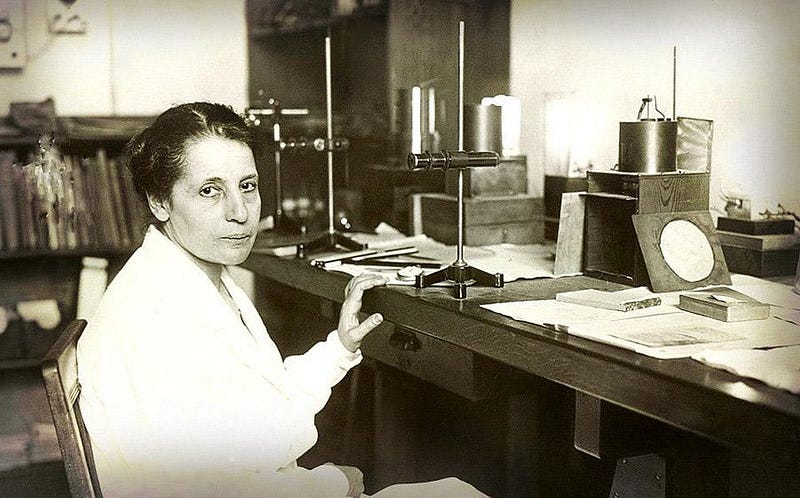
This is science. Our goal is to fully understand the Universe, one incremental step at a time. Our human failings are many, and we must not let them get the best of us. In Losing the Nobel Prize, Brian Keating exposes not only the failings of the Nobel Prize system, but also his own personal frailties. What emerges is a flawed but sympathetic read, where you’ll find yourself rooting not only for quality science to win out in the end, but for every contributor to work together in an open fashion for the benefit of human knowledge in general. We may be a long way from achieving that goal, but it’s arguable that by losing the Nobel Prize, Keating and BICEP2 has led us to an even greater victory: the recognition that there are more important things in this Universe, like scientific truths, than the fleeting glory of an earthly award.
Ethan Siegel is the author of Beyond the Galaxy and Treknology. You can pre-order his third book, currently in development: the Encyclopaedia Cosmologica.





